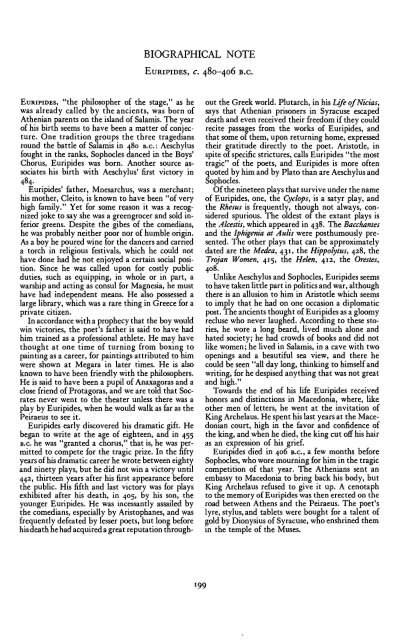Create successful ePaper yourself
Turn your PDF publications into a flip-book with our unique Google optimized e-Paper software.
EURIPIDES, "the philosopher of the stage," as he<br />
was already called by the ancients, was born of<br />
Athenian parents on the island of Salamis. The year<br />
of his birth seems to have been a matter of conjecture.<br />
One tradition groups the three tragedians<br />
round the battle of Salamis in 480 B.C.: Aeschylus<br />
fought in the ranks, Sophocles danced in the Boys'<br />
Chorus, Euripides was born. Another source associates<br />
his birth with Aeschylus' first victory in<br />
484.<br />
Euripides' father, Mnesarchus, was a merchant;<br />
his mother, Cleito, is known to have been "of very<br />
high family." Yet for some reason it was a recognized<br />
joke to say she was a greengrocer and sold inferior<br />
greens. Despite the gibes of the comedians,<br />
he was probably neither poor nor of humble origin.<br />
As a boy he poured wine for the dancers and carried<br />
a torch in religious festivals, which he could not<br />
have done had he not enjoyed a certain social position.<br />
Since he was called upon for costly public<br />
duties, such as equipping, in whole or in part, a<br />
warship and acting as consul for Magnesia, he must<br />
have had independent means. He also possessed a<br />
large library, which was a rare thing in Greece for a<br />
private citizen.<br />
In accordance with a prophecy that the boy would<br />
win victories, the poet's father is said to have had<br />
him trained as a professional athlete. He may have<br />
thought at one time of turning from boxing to<br />
painting as a career, for paintings attributed to him<br />
were shown at Megara in later times. He is also<br />
known to have been friendly with the philosophers.<br />
He is said to have been a pupil of Anaxagoras and a<br />
close friend of Protagoras, and we are told that Socrates<br />
never went to the theater unless there was a<br />
play by Euripides, when he would walk as far as the<br />
Peiraeus to see it.<br />
Euripides early discovered his dramatic gift. He<br />
began to write at the age of eighteen, and in 455<br />
B.C. he was "granted a chorus," that is, he was permitted<br />
to compete for the tragic prize. In the fifty<br />
years of his dramatic career he wrote between eighty<br />
and ninety plays, but he did not win a victory until<br />
442, thirteen years after his first appearance before<br />
the public. His fifth and last victory was for plays<br />
exhibited after his death, in 405, by his son, the<br />
younger Euripides. He was incessantly assailed by<br />
the comedians, especially by Aristophanes, and was<br />
frequently defeated by lesser poets, but long before<br />
his death he had acquired a great reputation through-<br />
BIOGRAPHICAL NOTE<br />
EURIPIDES, c. 480-406 B.C.<br />
199<br />
out the Greek world. Plutarch, in his Life ofNicias,<br />
says that Athenian prisoners in Syracuse escaped<br />
death and even received their freedom if they could<br />
recite passages from the works of Euripides, and<br />
that some of them, upon returning home, expressed<br />
their gratitude directly to the poet. Aristotle, in<br />
spite of specific strictures, calls Euripides "the most<br />
tragic" of the poets, and Euripides is more often<br />
quoted by him and by Plato than are Aeschylus and<br />
Sophocles.<br />
Of the nineteen plays that survive under the name<br />
of Euripides, one, the Cyclops, is a satyr play, and<br />
the Rhesus is frequently, though not always, considered<br />
spurious. The oldest of the extant plays is<br />
the Alcestis, which appeared in 438. The Bacchantes<br />
and the lphigenia at Au/is were posthumously presented.<br />
The other plays that can be approximately<br />
dated are the Medea, 431, the Hippolytus, 428, the<br />
Trojan Women, 415, the Helen, 412, the Orestes,<br />
408.<br />
Unlike Aeschylus and Sophocles, Euripides seems<br />
to have taken little part in politics and war, although<br />
there is an allusion to him in Aristotle which seems<br />
to imply that he had on one occasion a diplomatic<br />
post. The ancients thought of Euripides as a gloomy<br />
recluse who never laughed. According to these stories,<br />
he wore a long beard, lived much alone and<br />
hated society; he had crowds of books and did not<br />
like women; he lived in Salamis, in a cave with two<br />
openings and a beautiful sea view, and there he<br />
could be seen "all day long, thinking to himself and<br />
writing, for he despised anything that was not great<br />
and high."<br />
Towards the end of his life Euripides received<br />
honors and distinctions in Macedonia, where, like<br />
other men of letters, he went at the invitation of<br />
King Archelaus. He spent his last years at the Macedonian<br />
court, high in the favor and confidence of<br />
the king, and when he died, the king cut off his hair<br />
as an expression of his grief.<br />
Euripides died in 406 B.C., a few months before<br />
Sophocles, who wore mourning for him in the tragic<br />
competition of that year. The Athenians sent an<br />
embassy to Macedonia to bring back his body, but<br />
King Archelaus refused to give it up. A cenotaph<br />
to the memory of Euripides was then erected on the<br />
road between Athens and the Peiraeus. The poet's<br />
lyre, stylus, and tablets were bought for a talent of<br />
gold by Dionysius of Syracuse, who enshrined them<br />
in the temple of the Muses.





